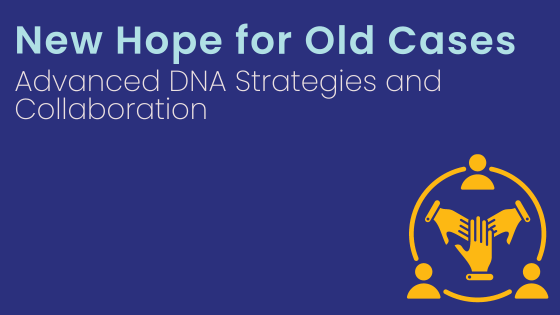With thousands of unsolved cases lingering in the archives of law enforcement agencies nationwide, the need for innovative and effective solutions has never been more pressing. This year, ISHI introduces an essential workshop: “Engaging Collaboration: How to Further Cold Cases with Advanced DNA Approaches.” Designed to bridge gaps and foster partnerships among forensic scientists, law enforcement officers, and legal professionals, this workshop promises to unveil cutting-edge DNA technologies and collaborative strategies that could turn the tide in cold case investigations. Attendees will gain unprecedented insights into the latest advancements in forensic DNA technology, learn from success stories, and explore practical techniques for enhancing multidisciplinary efforts. Whether you are a seasoned investigator or a forensic novice, this workshop is poised to equip you with the tools necessary to bring long-awaited closure to many awaiting justice.
Below, Jason Moran, Kimberly Gin, and Dr. Claire Glynn, who are presenting the workshop, offer their insights into the importance of this event at ISHI. With their combined expertise in forensic science, they address the pressing challenges in cold case investigations and discuss how attendees can benefit from the advanced DNA technologies and collaborative strategies presented during the workshop.

What motivated you to present this workshop at ISHI, and why do you believe it's a crucial addition to the conference?
The United States is experiencing a silent mass disaster of Missing and Unidentified Persons and has been for many, many years. This has led to massive amounts of Cold Cases sitting on the shelves of police departments and medical examiner/coroner’s offices throughout the country. Using DNA approaches to identify the unidentified and therefore locate the missing, is the key to solving this problem. Forensic scientists play a crucial role in terms of operating the DNA technologies and their appreciation of the outcome and impact of their work is more relevant than ever. That is why this workshop, “Engaging Collaboration: How to further cold cases with advanced DNA approaches” is a crucial presentation at ISHI 2024.
What unique challenges do cold case investigations present, and how does this workshop aim to address those through advanced DNA technologies and multidisciplinary collaboration?
Cold Case investigations have many unique challenges. Some of these are document and evidence retention, low quantity or degraded DNA samples, lack of skill set and resources from investigative agencies, and lack of support from decision makers. The composition of the workshop panelists exemplifies the importance of collaboration between law enforcement, coroners and forensic scientists and the utility of forensic investigative genetic genealogy. This workshop will discuss how to overcome these challenges using modern DNA approaches and multi-disciplinary teams.
In your experience, what are the main challenges in fostering multidisciplinary collaboration among forensic scientists, law enforcement, and legal professionals? Can you give us a sneak peek into the workshop and share some strategies for improving coordination in the cold case solving process?
The main challenge in fostering collaboration between multidisciplinary teams has less to do with agencies wanting to collaborate and more to do with a forum and resources to do so. Missing Person Days and DNA drives create an environment that fosters collaboration between teams and these relationships can be long lasting.

With the rapid advancements in DNA technology, what challenges do multidisciplinary teams face in ensuring ongoing education and training?
One of the challenges for multidisciplinary teams regarding rapid advancements in DNA technology is that the education and training is not able to adequately keep up with the advancements. This means agencies may need to learn from each other in many cases. Presentations such as this one can provide some much-needed information for these teams.
Many workshop attendees have never participated in a DNA Drive involving the public. Can you suggest some tips for organizing a successful event? What additional considerations need to be taken into account when engaging the public?
One tip for organizing a successful Missing Persons Day or DNA Drive is PLANNING. These types of events should be a “one stop shop” for families with Missing Persons in their lives. This goal requires planning and organization from event planners. The workshop will detail many of the steps required for success. Another consideration is managing the public’s expectations and wellbeing. For many reasons, the public’s expectations of the event outcomes may be unrealistic. This is especially true when it comes to timelines for success. The media is filled with stories of Cold Cases being resolved. This may influence how the public perceives individual outcomes. Planning ensures that many investigative items are completed prior to the event. An example would be to have all unidentified decedent’s DNA profiles available for comparison prior to the event to ensure that results are available contemporaneous to the event.
What unique perspectives do each of you bring to the workshop that attendees, especially forensic DNA analysts, will find invaluable in their pursuit of resolving cold cases?
Each of the presenters has extensive experience in human identification and working on multidisciplinary forensic teams surrounding Cold Cases. The presenters come from law enforcement, coroner, mass disaster, and forensic investigative genetic genealogy backgrounds. The presenters have utilized conventional, rapid, and consumer DNA to bring cases to a successful conclusion.
Registration is now open for “Engaging Collaboration: How to Further Cold Cases with Advanced DNA Approaches.” Designed for professionals seeking to integrate the latest DNA technologies into solving cold cases, it provides a platform to gain insights that can transform your laboratory’s approach to forensic science.
Reserve your spot to participate in discussions that could redefine the future of cold case investigations.

